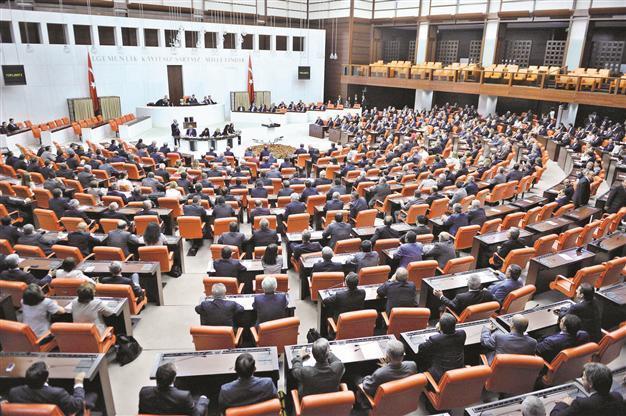President Gül, parliament speaker sit down to discuss new charter
ANKARA

Establishing a commission under Parliament’s roof to deal with the withdrawal of terrorists as part of the peace process in not likely, says Parliament Speaker Çiçek following meeting with the president.
At a moment when all eyes have turned to Diyarbakır in developments related to the peace process, the president and parliament speaker have discussed the efforts to re-write the Constitution as the parliamentary commission’s mandate nears an end.“
It was an objective briefing on the process the political parties have been carrying out and on the point the work [of the commission] arrived at,” Parliament Speaker Cemil Çiçek told reporters yesterday after his 90-minute meeting with President Abdullah Gül. Çiçek briefed Gül on the work of Parliament’s Constitution Conciliation Commission as its mandate nears an end at the close of March. A three-month extension was given to the commission at the end of December as the commission could not complete the writing process of the new Constitution.
When asked whether he could have meetings with the leaders of the political parties over the commission’s mandate, Çiçek said he could consider it if need be. “None of these parties have said ‘this is over.’ The support given us is still there. That’s why there is no such need at this stage,” he said. For Çiçek, the most vital thing to do is to increase the number of articles the four parties agree on before the end of the mandate so that he would have a reason to make a fresh appeal for the extension of the commission’s term.
Wise men issue
Çiçek responded to questions on another important issue, that of establishing a commission under Parliament’s roof to deal with the withdrawal of terrorists as part of the peace process. The Parliament Speaker hinted that it was not likely as there was no consensus among the parties represented at Parliament.
“It was not possible to have an ad-hoc commission, as there was no consensus among the parties. We are aware of the objections of some parties on this [peace] process,” Çiçek told reporters yesterday.
Establishment of a parliamentary commission emerged as one of the conditions Abdullah Öcalan, imprisoned leader of the outlawed Kurdistan Workers’ Party (PKK), requested to provide a secure withdrawal for PKK terrorists from Turkey. The government remained cool to the idea of having such a commission under Parliament’s roof.
“Theoretic discussions can be made but those who have the authority to proceed [with this idea] should make statements only after analyzing necessary procedures. I have expressed the situation in line with the internal regulations [of Parliament],” he stressed. Another way of establishing a parliamentary commission is to pass a law, Çiçek noted, something the ruling party is not in favor of. The establishment of a “wise-men” commission will be considered in the course of the process, Prime Minister Recep Tayyip Erdoğan said March 19.
For many, establishment of a monitoring commission could be useful to smooth the concerns of all sides. “I am of the belief that the call for wise men will bring a great contribution to the solution of this problem,” Ombudsman Nihat Ömeroğlu said March 21 in his meeting with EU ambassadors. Ömeroğlu was recently elected ombudsman as required by the EU. “I do not know whether I will be counted as a wise man but I myself, like all my colleagues, am ready to fulfill any duty given to me or to my institution for the benefit of our country and societal peace,” he said.
















